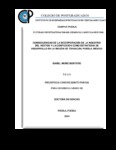| dc.contributor.author | Múñiz Montero, Isabel | |
| dc.creator | MUÑIZ MONTERO, ISABEL; 166149 | |
| dc.date.accessioned | 2014-04-11T22:24:31Z | |
| dc.date.available | 2014-04-11T22:24:31Z | |
| dc.date.issued | 2014 | |
| dc.identifier.uri | http://hdl.handle.net/10521/2232 | |
| dc.description | Tesis (Doctorado en Ciencias, especialista en Estrategias para el Desarrollo Agrícola Regional).- Colegio de Postgraduados, 2014. | en_US |
| dc.description.abstract | Las empresas trasnacionales han llevado sus procesos productivos intensivos en la modalidad de maquilas a los espacios rurales, con la finalidad de abaratar sus costos de producción y aumentar sus utilidades. El objetivo de la investigación fue analizar el impacto de la industria del vestido y la confección (en sus rubros trasnacional, nacional y clandestino) en el ámbito social y privado de los trabajadores, sin perder de vista el contexto regional general, evaluando la factibilidad del sistema maquilador como estrategia de desarrollo. El trabajo de campo se realizó en una región construida con cuatro municipios de Tehuacán, Puebla. Se implementó una metodología mixta donde se emplearon técnicas cuantitativas y cualitativas. Se concluye que la región y la población que labora en la maquila han sido afectadas en forma negativa, y que discursos en los que se considera al sistema maquilador como una estrategia viable de desarrollo oculta ventajas que solo favorecen a los empresarios. Lo anterior se observa en las afectaciones ambientales que sufre la región y en la vida de los obreros quienes han sido explotados y se ven afectados en diversos aspectos como son sus condiciones laborales, su poder adquisitivo, sus rutinas, su sexualidad, en la procreación, en la educación, en el trabajo infantil ilegal, en las enfermedades que sufren, y en el momento en que son desechados. Es en ese sentido que Estrategias de desarrollo regional que favorezcan a la población serán opuestas a la instalación del sistema maquilador. _______________ CONSEQUENCES OF INCORPORATION OF THE CLOTHING INDUSTRY AND THE PACKAGE AS A STRATEGY FOR DEVELOPMENT IN THE REGION TEHUACÁN, PUEBLA, MEXICO. ABSTRACT: Transnational corporations carried out their intensive production processes in the form of maquilas (manufacture) to rural areas, in order to lower their production costs and increase profits. The objective of the research was to analyze the impact of the clothing industry (in its transnational, national and underground field) in the social and private sector of the workers, without losing sight of the regional context, evaluating the feasibility of the maquiladora system as a development strategy. The fieldwork was conducted in a region built with Tehuacan´s four municipalities. A mixed methodology was implemented in which qualitative and quantitative techniques were used. We conclude that the region and the people who work in maquiladoras have been affected negatively, and those speeches in which the maquiladora system is considered as a viable development hides advantages that only favors employers. This is seen in environmental damage suffered by region and in the lives of workers, who have been exploited and are affected in several ways such as working conditions, their purchasing power, their routines, their sexuality, procreation, in education, illegal child labor, suffering on diseases, and when they are discarded. It is in this sense that regional development strategies that favoring the population will be opposite to maquila system installation. | en_US |
| dc.language.iso | spa | en_US |
| dc.subject | Ciclos de Explotación Familiar | en_US |
| dc.subject | Desarrollo | en_US |
| dc.subject | Explotación | en_US |
| dc.subject | Explotación Familiar Continua | en_US |
| dc.subject | Maquila Textil | en_US |
| dc.subject | Continuous Family Farm | en_US |
| dc.subject | Development | en_US |
| dc.subject | Exploration | en_US |
| dc.subject | Family Farm Cycles | en_US |
| dc.subject | Textile Industry | en_US |
| dc.subject | Estrategias para el Desarrollo Agrícola Regional | en_US |
| dc.subject | EDAR | en_US |
| dc.subject | Doctorado | en_US |
| dc.title | Consecuencias de la incorporación de la industria del vestido y la confección como estrategia de desarrollo en la región de Tehuacán, Puebla, México | en_US |
| dc.type | Tesis | en_US |
| Tesis.contributor.advisor | Ramírez Valverde, Benito | |
| Tesis.contributor.advisor | Juárez Sánchez, José Pedro | |
| Tesis.contributor.advisor | Figueroa Rodríguez, Oscar Luis | |
| Tesis.contributor.advisor | Ramírez Valverde, Gustavo | |
| Tesis.contributor.advisor | Martínez de Ita, María Eugenia | |
| Tesis.date.submitted | 2014 | |
| Tesis.date.accesioned | 2014-03-27 | |
| Tesis.date.available | 2014-04-11 | |
| Tesis.format.mimetype | pdf | en_US |
| Tesis.format.extent | 3,034 KB | en_US |
| Tesis.subject.nal | Entorno sociocultural | en_US |
| Tesis.subject.nal | Sociocultural environment | en_US |
| Tesis.subject.nal | Entorno socioeconómico | en_US |
| Tesis.subject.nal | Socioeconomic environmet | en_US |
| Tesis.subject.nal | Confección de vestuario | en_US |
| Tesis.subject.nal | Clothing Construction | en_US |
| Tesis.subject.nal | Costos de Producción | en_US |
| Tesis.subject.nal | Production Costs | en_US |
| Tesis.subject.nal | Desarrollo comunitario | en_US |
| Tesis.subject.nal | Community development | en_US |
| Tesis.subject.nal | Tehuacán, Puebla, México | en_US |
| Tesis.rights | Acceso abierto | en_US |
| Articulos.subject.classification | Industria del Vestido-Descripción del Trabajo | en_US |
| dc.type.conacyt | doctoralThesis | |
| dc.identificator | 5 | |
| dc.contributor.director | RAMIREZ VALVERDE, BENITO; 214709 | |

